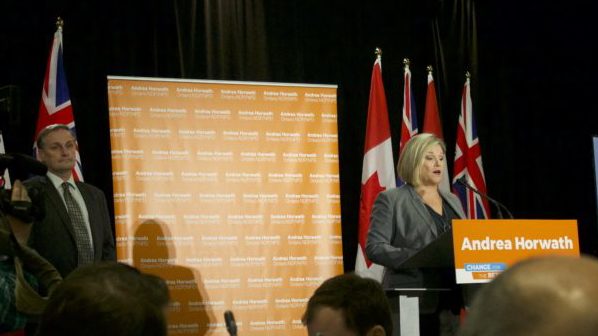
Ontario NDP Leader, Andrea Horwath delivers press conference at 2018 Ontario Budget lockup. [Taz Dhaliwal]
Taz Dhaliwal
Millennials can have a profound effect on the outcome of the Ontario election, but whether or not this age group will turn out at the polls is the big question, pollsters told Humber News.
The focus comes as millennial age voters outnumber baby boomers for the first time in the election on June 7.
Millennials will make up the largest segment of the electorate. Abacus CEO @Colettod was asked for his thoughts on their potential impact on the outcome. Watch here –> https://t.co/u3PdQB5MJZ #onpoli #ONPulse
— Abacus Data ?? (@abacusdataca) May 28, 2018
David Coletto, CEO of Abacus Data, said pollsters can have a hard time figuring out what the turnout and outcome will be at elections. But he does not see much evidence which would point to a high turnout among millennials in the vote.
“I think one of the challenges is going to be that the election is happening in June when most students aren’t on campus,” Coletto said in an interview on Tuesday.
“That ability to organize and mobilize students in particular is not going to be in place in this election the way it was during the federal election.”
Voter turnout during the federal election in 2015 rose by 20 per cent when Justin Trudeau was elected.
One of the areas that public opinion and market research firm Abacus specializes in is studying how this particular generation is shaping the world.
Abacus on its website said it found that the three major concerns amongst millennials related to housing affordability, access to good jobs, and student debt. Further, Coletto said that he thinks housing is one issue that none of the major political parties really dived into.
“On the one hand these parties do have appealing policies for young people, but the election hasn’t been about those things,” Coletto said. “The election is about change…what kind of change people want.”
He added that since the election has been “nasty” at times and not overly optimistic, some youth may not feel inspired to get involved.
However, Coletto went on to say that what sets millennials apart from previous generations is that they are more likely to vote for progressive, centre-left parties.
New #onpoli #ONPulse poll out at 5pm ET today. We were in the field Friday and Saturday. Here’s a sneak peek!
Be sure to visit https://t.co/QkV7L9Nq67 for all the details. pic.twitter.com/WKN0A1Ao8W— David Coletto ??? (@Colettod) May 27, 2018
“That might be a factor of being young versus being older, being a millennial versus a boomer,” he said.
“Millennials are more likely to rate climate change as a top priority; they’re more likely to believe in equality,” Coletto said adding that they, “not just believe it, but advocate for it and they want to see their politicians believing in it, and talking about equality regardless of gender, racial group, or sexual orientation.”
Millennials are far more educated than their parent’s generation, are more diverse, more entrepreneurial, and they communicate and get their information differently, Coletto also said.
Katrina Miller, public policy and communications expert from the Broadbent Institute, a policy think tank, said millennials are not being told why the issues being discussed in the election would matter to them.
This information should be passed on through social media channels they commonly use, she told Humber News, pointing out that access is another reason why younger voters may be turned off from the political process.
“We know that younger voters would be willing to vote more if they could do things like vote online,” Miller said. She said no improvements have been made on accessibility during this election.
Riley Peterson, a communications assistant at the Broadbent Institute who is also a young millennial, said she thinks that young people want to see their ideals reflected in the candidates, in terms of age and diversity, as well.
Peterson said that many of her friends are disengaged from the election. She agreed that updated accessibility to political issues and voting would help draw in more attention from potential young voters.
“I say this a lot: I don’t think youth are single issue voters,” said Peterson, who is 19.
“In my neighborhood, a lot of young people are concerned with healthcare, housing, jobs, and climate. change,” she said.
“Voting gives people a sense of ownership, and youth want to feel that too,” Peterson said. “I think it’s a lack of visibility, and them seeing themselves reflected…in party policy.”

